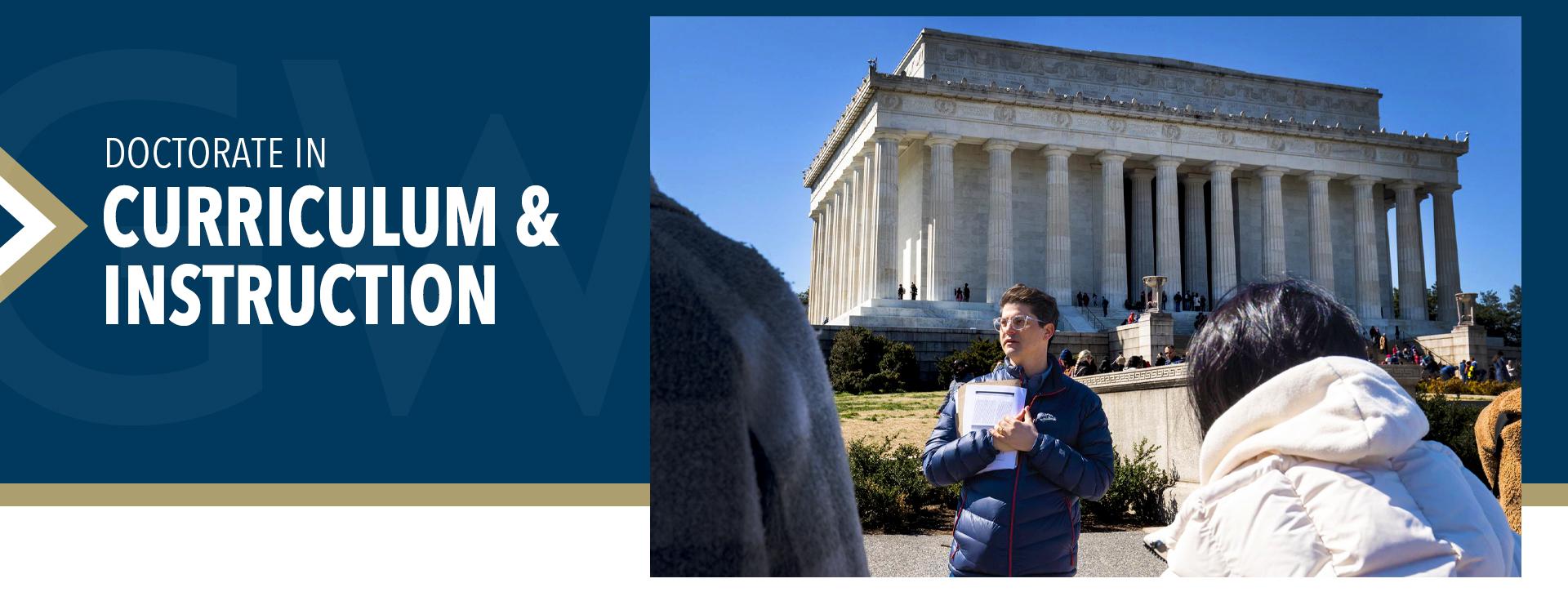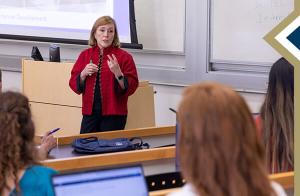Doctorate in Curriculum and Instruction
Make Discoveries That Matter
For Students, Teachers, Schools, and Society
Designed to meet the needs of working professionals, this Doctor of Education (EdD) in Curriculum and Instruction program focuses on research and reflective practice related to curriculum, teaching and learning, teacher education, and broader educational issues and policies.
Students become part of a vibrant professional community that actively links scholars with practicing professionals and educational organizations, creating a powerful network for innovation and leadership. Throughout the program, students explore pressing education issues relevant to their professional work and career goals.
Specialized Research Focus
Collaborate on a Research Practice Team and address pressing educational issues through hands-on research opportunities from the onset of the program.
Partnership Opportunities
Students become part of a community that links scholars with practicing professionals, policymakers, and educational organizations.
Share Your Voice
The research-active program offers publication and professional conference opportunities.
Only at GW
Education is the foundation for societal transformation. Where better to study and prepare to influence this transformation than in the heart of the nation’s capital at the George Washington University, alongside leading international education institutions and diverse school systems?
Degree:
Doctor of Education (EdD) in the Field of Curriculum and Instruction
Department:
Curriculum and Pedagogy
Course Delivery:
-Foggy Bottom Campus
-Virginia Academic Centers
-Hybrid (select research teams)
Program Entry:
Fall
- Our Mission
The mission of our program is to:
- Cultivate a vibrant and diverse community of education scholars.
- Explore research and practice related to pressing issues in education.
- Develop, study and share exciting innovations in curriculum, teaching, and learning.
- Curriculum Requirements
The following requirements must be fulfilled: A minimum of 48 credits, successful completion of a comprehensive examination, and a doctoral dissertation. This includes the successful completion of an oral defense of the proposal and the completed dissertation.
View full requirements for the Doctor of Education programs >
Required CPED 8325 Curriculum Theory CPED 8330 Foundations of Education Research in Curriculum and Instruction CPED 8331 Seminar in Teaching CPED 8334 Seminar in Learning Doctoral Internship CPED 8354 Doctoral Internship (taken for 6 to 9 credits) Research Methods In consultation with advisor, 9 credit hours of research methods coursework:EDUC 8120 Group Comparison Designs and Analyses * EDUC 8122 Qualitative Research Methods Electives 3 to 6 credits in elective courses selected in consultation with advisor. Comprehensive Examination Successful completion of a comprehensive examination is required. Dissertation CPED 8998 Doctoral Seminar in Curriculum and Instruction (taken for 3 credits) CPED 8999 Dissertation Research (taken for a minimum of 12 credits to meet program requirements) An approved dissertation proposal is required. *Prerequisite statistics courses must be taken during the master's degree program or must be completed prior to taking required advanced courses. For students who have not had an introductory statistics course or do not feel confident in their understanding and application of basic statistical techniques (i.e., through one way analysis of variance), EDUC 6116 should be completed prior to enrolling in EDUC 8120.
- Program Outcomes
This program prepares education leaders to apply knowledge of curriculum, teaching, learning, and research to transform practice.
Graduates will:- Be skilled in collaborating with schools, districts, and institutional partners to create innovative education activities;
- Know how to design and conduct research to transform practice;
- Demonstrate and facilitate professional learning in diverse settings.
Research Practice Teams
Curriculum and Instruction EdD students are admitted to join a Research Practice Team based on their interests, experience, and career goals. Each team consists of a faculty advisor and doctoral students conducting research related to the team's focus. Applicants should identify which team they would like to be considered for in their statement of purpose. We are currently accepting applications to the following teams:
- Using Data to Support Innovation
How can you as a teacher, counselor, school leader, or education professional use data to improve fairness in education and promote new opportunities to learn for students?
This research team aims to develop skills and practices for using data to leverage patterns in existing data to drive innovation and research.
We believe that teaching, learning, and assessment today is increasingly shaped by how individual student level data, state level data, and international data are interpreted and used. However, teachers and professionals in education who serve students and communities are often one step removed from first-hand inquiry with data. This team is committed to placing experienced educators at the center of data analysis and interpretation. The goal of the team is to produce findings that inform practice and point to innovative solutions to problems of fairness and access in curriculum offerings for college and career success.
As a doctoral student on this team, you may:
- Discover patterns and trends in existing data to better understand a problem of practice you experience every day.
- Learn to apply data science techniques to big data in education to make predictions and classifications that can open curricular pathways for students.
- Use data analytics to learn more about student competencies that may lead to placement in instructional interventions or curriculum pathways that improve access to college or career.
- Generate new qualitative or quantitative data on emerging curricular or instructional problems to shape future innovation.
The research process in this team starts with identifying a personal interest within the team’s focus on fairness and access to curriculum offerings for college and career success. The team will review prior research and analyze existing data. Innovations are then studied in-depth to validate their efficacy for improving learning outcomes. Dissertation research might entail continued analysis of existing data or collection of new data. Current and former teachers and school leaders are encouraged to apply.
For more information, please contact Dr. Curtis Pyke (cpyke
 gwu [dot] edu (cpyke[at]gwu[dot]edu)) or Dr. Jonathon Grooms (jgrooms
gwu [dot] edu (cpyke[at]gwu[dot]edu)) or Dr. Jonathon Grooms (jgrooms gwu [dot] edu (jgrooms[at]gwu[dot]edu)).
gwu [dot] edu (jgrooms[at]gwu[dot]edu)).- Student Perspectives in Science Education
Doctoral students on this RPT will work with innovative science teachers to understand how new instructional approaches or curriculum changes are experienced by their students. Drawing on the intended-enacted-experienced curriculum model (Clements, Donovan, Theobold, & Crowe, 2021) and the concept of coherence seeking (Sikorski & Hammer, 2019), the team will explore:
- In what ways is the implementation of a new science curriculum perspective-dependent? How might students’ perspectives be similar or different from the teacher?
- When and in what ways might differences in students’ and teachers’ perspectives on curriculum be helpful and generative for science learning? When might these differences be problematic?
- How can information about students’ and teachers’ perspectives be helpful for supporting curriculum design, implementation, and change?
Doctoral students on the team will have opportunities to present their work to teachers, researchers, potential funders, and administrators through a variety of venues. This team will be based in the DC-metro region and will involve face-to-face meetings and classes. Applicants to the team should demonstrate an interest in improving science education. (Prior experience as a science teacher or curriculum developer is helpful, but not required.) Individuals with expertise in educational technology, special education, and multilingual science instruction are encouraged to apply.
For more information, please contact Dr. Tiffany Sikorski (tsikorski
 gwu [dot] edu (tsikorski[at]gwu[dot]edu)) or Dr. Karen Kortecamp (karenkor
gwu [dot] edu (tsikorski[at]gwu[dot]edu)) or Dr. Karen Kortecamp (karenkor gwu [dot] edu (karenkor[at]gwu[dot]edu)).
gwu [dot] edu (karenkor[at]gwu[dot]edu)).- Professional Learning
Partnering with an internationally renowned PreK-12 school committed to educator professional learning and a large regional network of educators it leads, and D.C.’s world-renowned museums, this Research Practice Team (RPT) will engage in research to identify crucial features and strategies of high impact, effective professional learning. A focus of the RPT is on understanding the interaction between the effectiveness of professional learning and its effects on educator practice and student learning. The team will explore:
- Which aspects of professional learning work, don’t work, and why?
- What are the challenges to developing effective professional learning programs for educators?
- Which design features effectively improve instructional practice and student outcomes across classrooms and contexts?
- Which design features are particularly effective in schools serving large concentrations of students living in poverty or from historically marginalized backgrounds?
- How can professional learning most effectively support teaching for equity and justice?
- What data are needed to correlate education professional learning with student outcomes?
The RPT experiences will prepare graduates to apply knowledge and insights to design, implement, evaluate, and sustain effective professional learning in schools and museums. Individuals in early childhood and K-12 education, museum and heritage site education, social sciences, and non-profit organizations are encouraged to apply. The work of this RPT will be
shared through international conferences and publications in high impact venues.For more information, please contact Dr. Karen Kortecamp (karenkor
 gwu [dot] edu (karenkor[at]gwu[dot]edu)) or Dr. Tiffany Sikorski (tsikorski
gwu [dot] edu (karenkor[at]gwu[dot]edu)) or Dr. Tiffany Sikorski (tsikorski gwu [dot] edu (tsikorski[at]gwu[dot]edu)).
gwu [dot] edu (tsikorski[at]gwu[dot]edu)).
Apply Now
GSEHD’s Office of Admissions invites you to apply for a spot in our program. Please review the following admission and financial information.
Ready to take the next step in your career? Review our step-by-step guide to applying to GSEHD >
To learn more about the program, admission process, and upcoming events, please connect with the GSEHD Admissions Team at teachinfo![]() gwu [dot] edu (teachinfo[at]gwu[dot]edu) or 202-994-9283.
gwu [dot] edu (teachinfo[at]gwu[dot]edu) or 202-994-9283.
| Apply Now | Meet with Admissions Coach |
To be considered for admission, applicants must submit the online application form as well as the following required supporting documents. There is no application fee.
- Prerequisite: Master's Degree
- Resume
- Transcripts from all previously attended colleges or universities
- Statement of Purpose addressed to a specific Research Practice Team
- 2 Letters of Recommendation, preferably one from a faculty member and the other from a professional supervisor
- Interview with Faculty
*Additional application requirements may exist for international applicants.
Applications are now being accepted for Fall 2026. We encourage you to apply as early as possible.
Application Timeline Fall Priority Deadline Nov 1 Round 1 Deadline Dec 1 Round 2 Deadline Jan 15 Round 3 Deadline March 1 Round 4 Deadline May 1 Round 5 Deadline June 15 Round 6 Deadline Aug 1 For more information or to inquire about the next admissions cycle, contact the GSEHD Admissions Team at teachinfo
 gwu [dot] edu (teachinfo[at]gwu[dot]edu) or 202-994-9283.
gwu [dot] edu (teachinfo[at]gwu[dot]edu) or 202-994-9283.
Tuition & Financial Aid
We know embarking upon graduate school is a big decision - due in part to the costs of attending. At GW, we understand the time and thought behind making graduate school work for you. Please take a moment to learn more about the options and opportunities available to help fund your graduate education.
Graduate tuition is charged per credit hour, unless otherwise noted. Rates vary by program and location.
- Students admitted Fall 2020 to present day: The tuition rate* for the Hybrid EdD in Curriculum and Instruction program is $1,265 per credit hour.
- This program requires a minimum of 48 credits.
- This program requires a minimum of 48 credits.
- Students admitted through Summer 2020: The tuition rate* for the On-Campus EdD in Curriculum and Instruction program is $1,960.
- This program requires a minimum of 66 credits.
- This program requires a minimum of 66 credits.
Please note: Additional fees may apply for international students, late fees, etc. Current tuition rates may be updated during the year.
*Summer 2025, Fall 2025 and Spring 2026
Scholarships are available to eligible admitted students. Review eligibility requirements and learn more about funding your education >
As an educator with extensive experience in schools, museums, non-profit organizations, and the private sector, pursuing my Doctor of Education at GW is an exciting opportunity for me to further advance my pedagogical expertise and prepare myself for addressing the current educational challenges of our era. As a member of the Informal Learning in the Arts Research Practice Team, I've had the opportunity to conduct research that was presented at top education conferences, including the 2023 American Educational Research Association annual meeting.
WILLIAM ZHOU (Current Student)
Career Outlook
An Ed.D. in Curriculum and Instruction opens a broad range of career pathways focused on improving teaching practices, learning experiences, and curriculum design. Experts in curriculum and instruction can be found working in K-12 schools and districts; in museums and informal learning settings; within two- and four-year colleges; and at corporate, non-profit, and consulting firms.
- Curriculum & Instruction Career Pathways
-
- Curriculum Specialist: Works directly with instructors to develop learning standards, evaluate new materials (textbooks, technology), and ensure instructional quality.
- Director of Curriculum Development: Oversees curriculum design, implementation, and assessment for an entire organization.
- Education Consultant: Works as an independent contractor or for a firm, advising school districts, companies, or universities on curriculum revision, program evaluation, or professional development.
- Clinical Faculty Member: Specialized instructor in higher education who utilizes their extensive real-world professional expertise to focus primarily on teaching, supervising, and mentoring students.
- Learning and Development Specialist: Designs, develops, and evaluates engaging training programs, modules, and courses for business or government organizations.
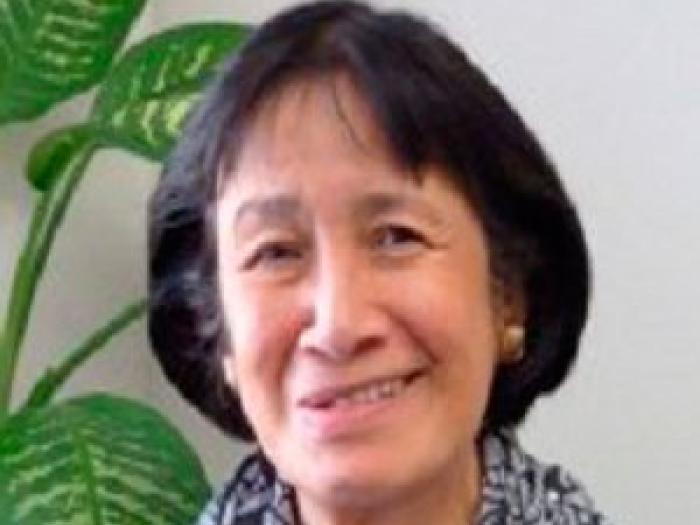
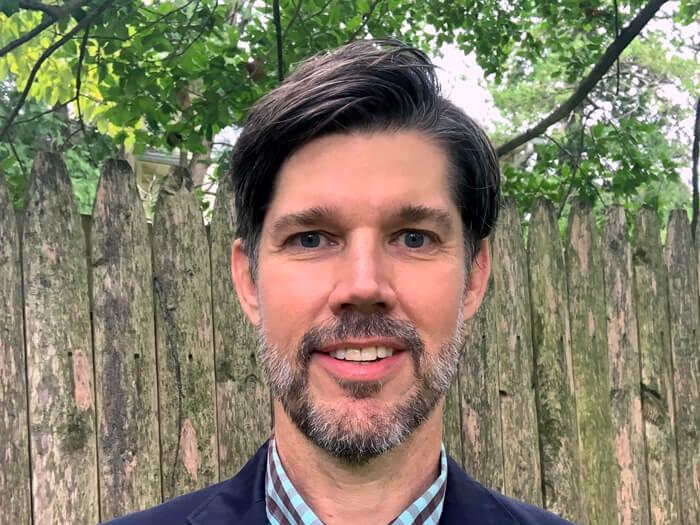


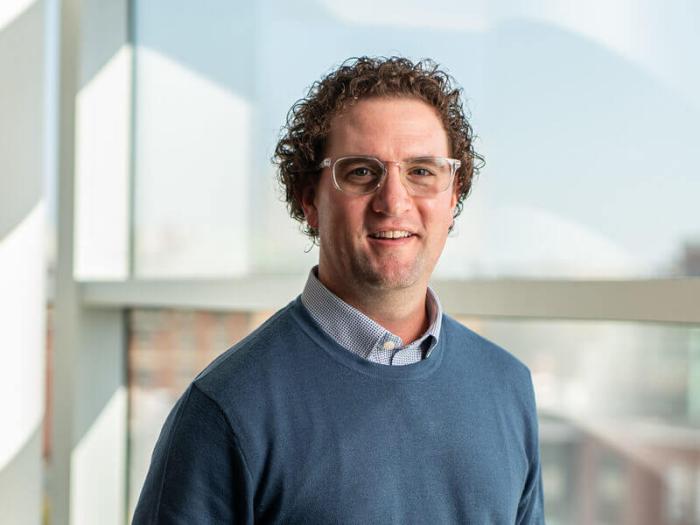
Associate Professor, Curriculum and Pedagogy; Co-Director, GWTeach
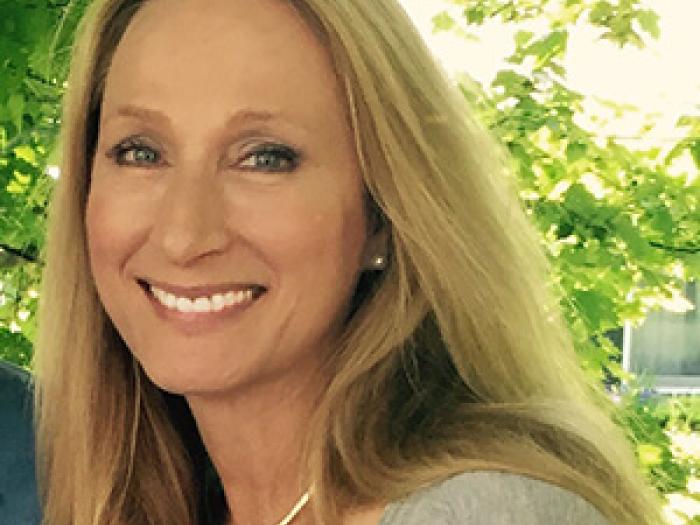
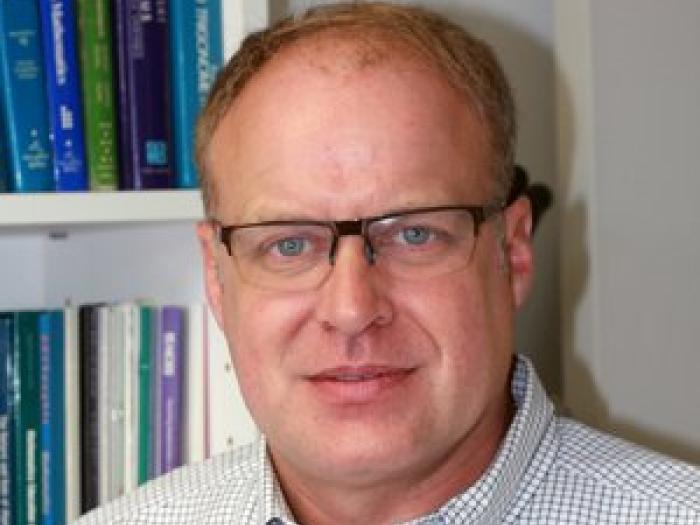

Associate Professor, Curriculum and Pedagogy


